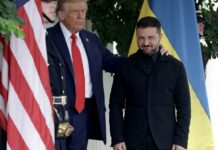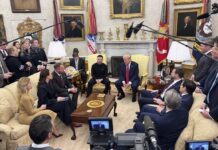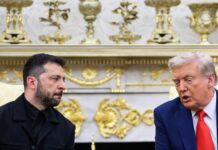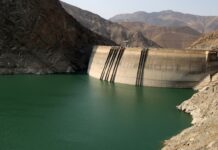
This photo shows a general view of a North Korean giant loudspeaker (C), near the Demilitarized Zone (DMZ) dividing the two Koreas, in Paju on June 12, 2025. Anthony Wallace/AFP via Getty Images hide caption
toggle caption
Anthony Wallace/AFP via Getty Images
GANGHWA, South Korea — Kim Ok-soon used to take bike rides along a waterfront road near her home with her grandchildren after dinner.
The road in her farming village of Dangsan-ri in Ganghwa Island looks over rice paddies to one side that attract long-legged birds and reflect the moon at night.

Ukraine invasion — explained
North Koreans fighting for Russia against Ukraine have grown skilled in drone warfare
The other side, toward the Han River estuary, is lined with fences and occasional military guard posts. Just over a mile beyond is North Korea.
One evening last July, Kim says a mixture of noises she describes as “ghostly sounds, raven sounds, wolf sounds” started blaring toward the village, from a loudspeaker atop a hill across the river.
“It was so scary we couldn’t go outside,” Kim says. “Our everyday life was shattered.”
About a month earlier, South Korea had started blasting propaganda broadcasts from its loudspeakers along the inter-Korean border. And North Korea was now reciprocating.
The loudspeaker battle continued for a year. Villagers of Dangsan-ri and other border towns had to live with unnerving noises day and night.
Then, last week, the new South Korean president, Lee Jae Myung, ordered a stop to South Korea’s broadcasts. North Korea returned the favor within hours, stopping its own blasting of sounds across the border.
Lee has pledged to pursue peace with the North through dialogue and cooperation. The decision to turn off loudspeakers was his first move. Presidential spokesperson Kang Yu-jung said the decision was made to alleviate military tension and restore trust between the two Koreas.
Lee’s North Korea policy is a marked shift from his predecessor Yoon Suk Yeol, who emphasized “peace through strength.”
As North Korea cut off inter-Korean communication and made military advancements, Yoon responded with tit-for-tat measures. During his time in office, both Koreas revoked the 2019 military pact that banned tension-raising activities in the border region, including loudspeaker broadcasts.
The two Koreas have engaged in psychological warfare since the 1960s, with weapons like huge billboard screens, loudspeakers installed along the border, and airdropping propaganda leaflets.
But the confrontation particularly escalated under the Yoon administration.
After South Korea’s Constitutional Court ruled in 2023 that the law criminalizing leafleting excessively limits freedom of expression, the government gave defector groups a free hand to send balloons and plastic bottles across the border carrying leaflets and thumb drives with South Korean TV dramas.
The North Korean regime, which is increasingly closing off its society from outside information, retaliated by sending its own balloons toward the South, carrying mostly trash, beginning in May last year.
Seoul then resumed its loudspeaker campaigns, and Pyongyang soon followed.
But unlike the previous North Korean broadcasts that slandered South Korean leaders and glorified its own leaders, this time North Korea was just blasting noise, and it came at random times.
“Sometimes they keep it on for 24 hours. And sometimes they are quiet for two straight days. That makes it more nerve-racking,” says Dangsan-ri’s village chief, Ahn Hyo-cheol.
NPR visited the village while the loudspeaker broadcasts were still underway.

Asia
South Korea elects liberal Lee Jae-myung after months of political turmoil
Ahn has lived in the town all his life and was familiar with North Korean propaganda. But he says the noises stressed him out so much that his eyesight was affected.
In a sample survey by the local public health clinic, he says, 100% of the surveyed residents said they are sleep deprived. According to Ahn, the noise was at times as loud as 95 decibels, which is similar to the noise of a subway train approaching a station .
“We are all just farmers. They shouldn’t be blasting the sound toward this village,” Ahn says.
But some argue that the broadcasts South Koreans were blasting towards North Korea were actually appreciated on the other side of the border.
Ahn Chan-il defected to the South in the 1970s while serving at a border unit of the North Korean military. He heard South Korea boasting in its broadcast about the number of cars it makes and the number of refrigerators and televisions its people have. And he could see from the guard post he was manning the helicopters and vehicles moving on the other side.
North Korea, once ahead of its southern rival, was beginning to lag behind. Ahn’s unit was getting less meat and fish in their meals.
“Because I could confirm with my own eyes, I was more assured that North Korea wouldn’t be a match,” says Ahn, who is now a scholar and activist leading the Seoul-based think tank World Institute for North Korea Studies.
He says North Korea blared noises instead of propaganda because the country knows its messages are useless in persuading South Koreans. And that North Korea promptly responded to the South’s conciliatory gesture, he says, to save scarce electricity.
“But it would be careless to think that Kim Jong Un would be open to holding an inter-Korean summit or reopening the joint industrial complex just because the broadcast stopped,” says Ahn.
In the past few years, the North Korean leader has ignored calls for dialogue from South Korea and the United States. He has instead focused on starting and cementing a new alliance with Russia.
And to continue this strategy, Ahn says, Kim would want inter-Korean tensions to remain high, regardless of the loudspeakers.












